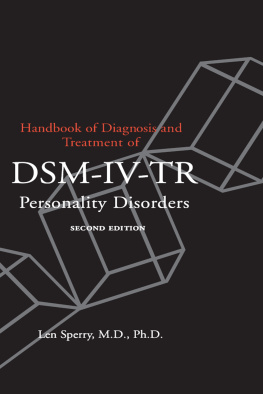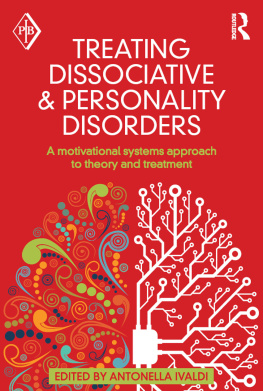Metacognitive Interpersonal Therapy for Personality Disorders
Patients with personality disorders need targeted treatments which are able to deal with the specific aspects of the core pathology and to tackle the challenges they present to the treatment clinicians. Such patients, however, are often difficult to engage, are prone to ruptures in the therapeutic alliance and have difficulty adhering to a manualised treatment.
Giancarlo Dimaggio, Antonella Montano, Raffaele Popolo and Giampaolo Salvatore aim to change this, and have developed a practical and systematic manual for the clinician using metacognitive interpersonal therapy (MIT) and including detailed procedures for dealing with a range of personality disorders. The book is divided into two parts, Pathology, and Treatment, and provides precise instructions on how to move from the basic steps of forming an alliance, drafting a therapy contract and promoting self-reflections to the more advanced steps of promoting change and helping the patient move toward health and adaptation.
With clinical examples, summaries of therapies and excerpts of session transcripts, Metacognitive Interpersonal Therapy for Personality Disorders will be welcomed by psychotherapists, clinical psychologists and other mental health professionals involved in the treatment of personality disorders.
Giancarlo Dimaggio is a co-founding member of the Center for Metacognitive Interpersonal Therapy. He is the author of four books and numerous articles.
Antonella Montano is a founding member and director of the psychotherapy school at A. T. Beck Institute for Cognitive Behavior Therapy. He is a teacher and supervisor of the Associazione Italiana Analisi e Modificazione del Comportamento (AIAMC), a certified trainer/consultant/speaker/supervisor of the Academy of Cognitive Therapy (ACT), a member of the International Association for Cognitive Psychotherapy (IACP) and a member of the International Society for Sexual Medicine (ISSM).
Raffaele Popolo is a co-founding member of the Center for Metacognitive Interpersonal Therapy, a trainer at the Societ Italiana di Terapia Comportamentale e Cognitiva (SITCC) and a trainer of the psychotherapy school Studi Cognitivi. He has written papers on psychopathology and the treatment of personality disorders and psychosis.
Giampaolo Salvatore is a co-founding member of the Center for Metacognitive Interpersonal Therapy, a trainer at A. T. Beck Institute for Cognitive Behavior Therapy. He has written papers about the psychotherapeutic process and the pathology and treatment of schizophrenia and personality disorders, and in particular of persons with paranoid features.
First published 2015
by Routledge
27 Church Road, Hove, East Sussex, BN3 2FA
and by Routledge
711 Third Avenue, New York, NY 10017
Routledge is an imprint of the Taylor & Francis Group, an informa business
2015 Giancarlo Dimaggio, Antonella Montano, Raffaele Popolo and Giampaolo Salvatore
The right of Giancarlo Dimaggio, Antonella Montano, Raffaele Popolo and Giampaolo Salvatore to be identifi ed as authors of this work has been asserted by them in accordance with sections 77 and 78 of the Copyright, Designs and Patents Act 1988.
All rights reserved. No part of this book may be reprinted or reproduced or utilised in any form or by any electronic, mechanical, or other means, now known or hereafter invented, including photocopying and recording, or in any information storage or retrieval system, without permission in writing from the publishers.
Trademark notice: Product or corporate names may be trademarks or registered trademarks, and are used only for identifi cation and explanation without intent to infringe.
British Library Cataloguing in Publication Data
A catalogue record for this book is available from the British Library
Library of Congress Cataloging-in-Publication Data
Dimaggio, Giancarlo, author.
[Terapia metacognitiva interpersonale per i disturbi di personalit?. English]
Metacognitive interpersonal therapy for personality disorders : a
treatment manual / Giancarlo Dimaggio, Antonella Montano, Raffaele
Popolo, and Giampaolo Salvatore.
pages cm
1. Personality disordersTreatment. 2. Metacognition. I. Montano,
Antonella, author. II. Popolo, Raffaele, author. III. Salvatore, Giampaolo,
author. IV. Title.
RC455.4.B5D5613 2015
616.8581dc23
2014033799
ISBN: 978-1-138-02415-1 (hbk)
ISBN: 978-1-138-02418-2 (pbk)
ISBN: 978-1-315-74412-4 (ebk)
Typeset in Times
by Deer Park Productions
Contents
| ABC | antecedent, belief, consequence |
| ACT | acceptance and commitment therapy |
| APA | American Psychiatric Association |
| A-PST | Advanced Picture Sequencing Task |
| ATT | attentional training |
| BDI | Beck Depression Inventory |
| BLERT | Bell-Lysaker Emotional Recognition Task |
| BVAQ | Bermond-Vorst Alexithymia Questionnaire |
| CAS | cognitive attentional syndrome |
| CBT | cognitive behavioural therapy |
| CBT-E | enhanced transdiagnostic CBT for eating disorders |
| CCRT | core conflictual relational theme |
| DBT | dialectical-behaviour therapy |
| DERS | Difficulties in Emotion Regulation Scale |
| EIS | Emotional Inhibition Scale |
| ERP | exposure and response prevention |
| ERQ | Emotion Regulation Questionnaire |
| IIP | Inventory of Interpersonal Problems |
| MAI | Metacognition Assessment Interview |
| MAS-R | Metacognition Assessment Scale Revised |
| MBSR | mindfulness-based stress reduction |
| MCMI | Millon Clinical Multiaxial Inventory |
| MCT | metacognitive therapy |
| MIT | metacognitive interpersonal therapy |
| MOSST | Metacognitive Oriented Social Skills Training |
| MSCEIT | Mayer-Salovey-Caruso Emotional Intelligence Test |
| PD | personality disorder |
| PDNOS | personality disorder not otherwise specified |
| SCL | Symptom Checklist |
| STAI | State-Trait Anxiety Inventory |
| TAS | Toronto Alexithymia Scale |
| ToM | theory of mind |
| TR | thought recording |
| TZPD | Therapeutic Zone of Proximal Development |
| YSQ | Young Schema Questionnaire |
Time was ripe. Psychotherapies for personality disorders (PDs) have undergone a major leap during the last twenty years. We know better their self-sustaining mechanisms, that they respond to treatment (unlike the pessimism of some decades ago) and that drop-out can be kept to a reasonably low amount. But it is a patchy evolution. The majority of progress was made with borderline PD, for which many treatments of proven effectiveness exist and are currently under refinement and further empirical testing. For all the other PDs, except avoidant and narcissistic, the literature is scanty and fragmented. The clinician wanting to treat dependent, paranoid, obsessive-compulsive PD or depressive, passive-aggressive and schizoid traits, has to dig hard to find a well full of water. The bias towards borderline PD is unjustified, as the other PDs are overall much more prevalent and can be just as severe as the former.













